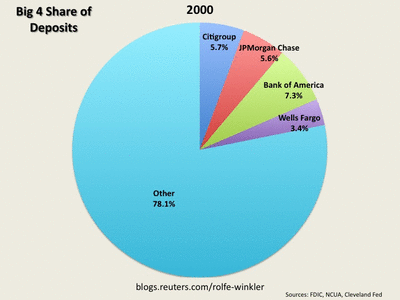On The Economic Populist you might have noticed the middle column. We try to list other sites and blogs who have exceptional insight and writing on what is happening in the U.S. economy.
Sometimes though, one cannot say it better but miss those who did.
Must Read Post #1
We have astounding statistics on how the financial sector has grown and how just a few of our Zombie banks control it in this detailed Naked Capitalism guest post. The combined assets of the 6 largest U.S. banks are now 63% of U.S. GDP!

Must Read Post #2
Below is an interview from Yahoo Tech Ticker with Martin Wolf on Goldman Sachs and their Greek currency swap deals. (h/t HuffPo)
Must Read Post #3 Simon Johnson says there is no international financial regulation from Congress and points out how easy it is for banks to do border hopping to avoid, well, just about everything. Part of the answer, of course, is that big cross-border banks know how to play governments off against each other – dropping heavy hints that “international competitiveness” is at stake. These are empty threats – if the US, the UK, and the eurozone cooperated on a resolution regime, this would get serious attention. If they went further and truly integrated their regulations – including communications and practices (and inspections) across regulators/supervisors – this could have major impact. Must Read Post #4 Econbrowser does a great call out on deficit causes with graphs and it ain't this health care bill (not that I'm thrilled with better than nothing legislation). Must Read Post #5 This post on Econbrowser implies a doubling of exports will increase offshore outsourcing. It's abstruse, with terms such as heterogenous firms (read multinational corporations with facilities abroad), but if you can drill down, what it's saying is exporters have a tendency to be labor arbitragers, i.e. here comes more offshore outsourcing and U.S. worker displacement. What kills me are the terms. International economics won't just spit it out on their theories, which frankly, the results? All they will say is one should mitigate protectionist measures so all of those unemployed and financially wiped out people can enjoy cheaper prices at big box stores. Anywho, the point is it implies less jobs, not more. Anywho, very surprising result on a seemingly innocuous goal of doubling exports. 

Recent comments